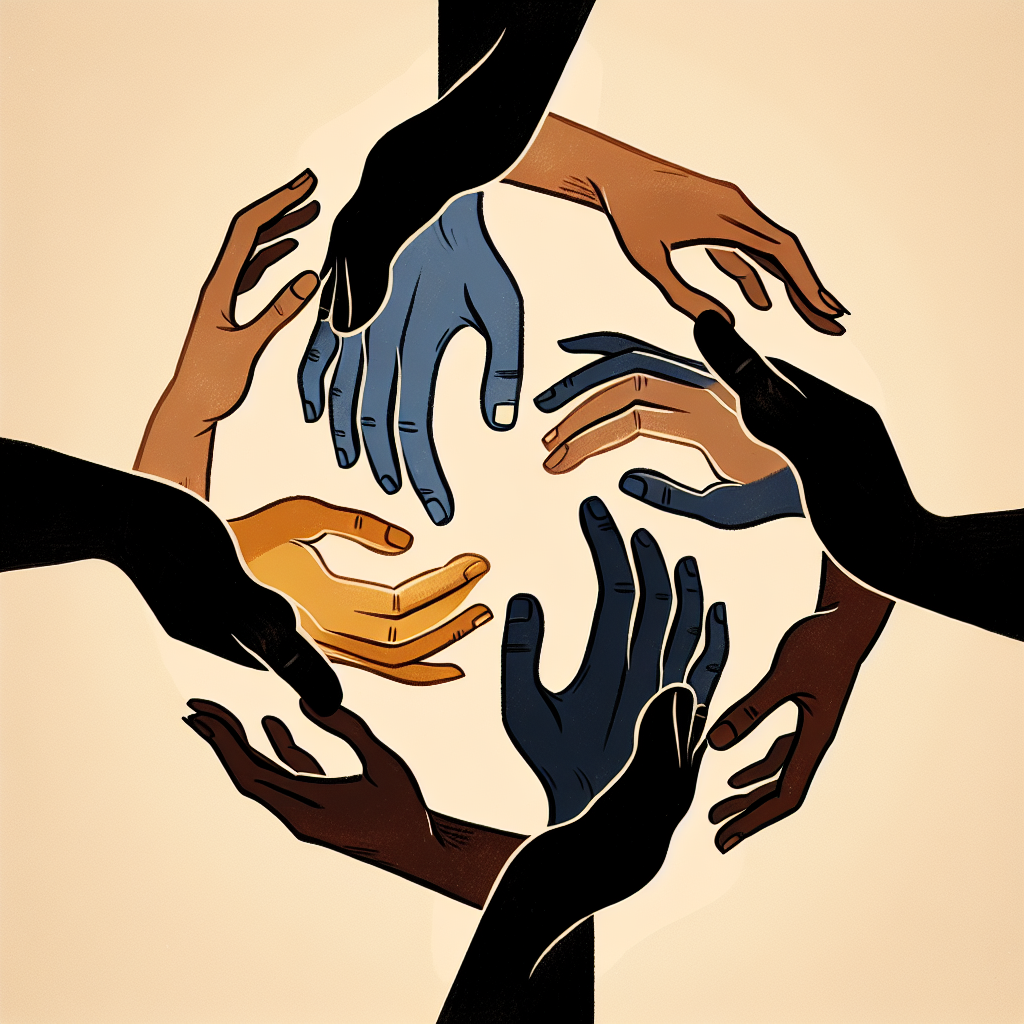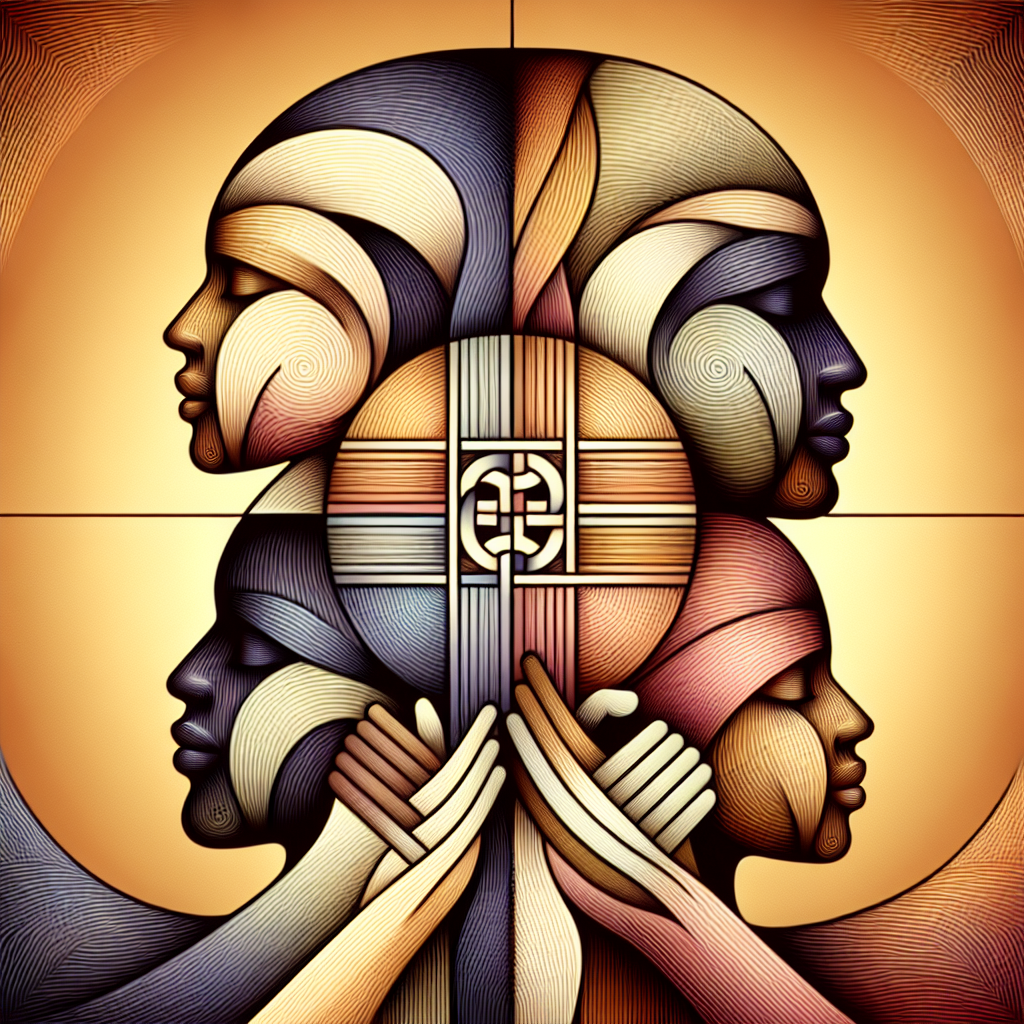In the world of unconventional relationship dynamics, a question often arises: what is a 4 way relationship called? Often mistaken for polyamory or swinging, a 4 way relationship, also known as a quadrilateral or quad relationship, involves four individuals who are romantically or sexually involved with each other in various combinations. This unique setup challenges traditional notions of love and partnership, offering a more complex and interconnected approach to navigating intimacy. In this article, we will explore the intricacies of a 4 way relationship, shedding light on its different forms, dynamics, and potential benefits.

Definition of a 4 Way Relationship
A 4-way relationship, also known as a quadrilateral relationship or multilateral relationship, is a type of consensual non-monogamous relationship involving four individuals who are romantically and/or sexually involved with each other. In this unique relationship dynamic, all four individuals are connected to each other and maintain emotional and physical relationships with one another. It is important to note that a 4-way relationship can take many forms and variations, and the boundaries and dynamics within each relationship can differ greatly.
Understanding 4 Way Relationships
4-way relationships are a form of non-traditional relationship structure that challenges societal norms of monogamy. Unlike traditional monogamous relationships that involve only two individuals, 4-way relationships expand the concept of romantic and emotional connections to multiple partners. These relationships are built on the principles of open communication, trust, and mutual respect among all parties involved.
Characteristics of a 4 Way Relationship
One of the key characteristics of a 4-way relationship is the involvement of four individuals who are equally committed to each other. Each person treats all others with the same level of love, respect, and dedication. These relationships often require a high level of emotional maturity, as they involve managing multiple connections simultaneously. Consensual non-monogamy, which is pivotal in 4-way relationships, allows for the exploration of emotional and physical connections beyond monogamy.
Important Factors in a 4 Way Relationship
Open and honest communication is an essential factor in maintaining a healthy and successful 4-way relationship. All individuals involved must express their thoughts, feelings, and desires openly and honestly, ensuring that everyone is on the same page. Establishing clear boundaries and consent agreements is also crucial to maintaining trust and respecting each individual’s needs and comfort levels. Continuous self-reflection and growth are essential, as individuals must be willing to confront and address their own insecurities, jealousies, and emotional challenges that may arise in a 4-way relationship.

Different Terms for 4 Way Relationships
Polyamory
Polyamory is a term often used to describe 4-way relationships. It is a relationship structure that allows for multiple romantic and/or sexual relationships with the knowledge and consent of all parties involved. Polyamory is centered around the belief that love is not a limited resource and can be shared and experienced with multiple partners simultaneously.
Group Relationship
The term “group relationship” refers to a relationship involving more than two individuals who have emotional and/or sexual connections with each other. In the context of a 4-way relationship, this term encompasses the idea that all individuals in the relationship are considered equal partners and share a mutual commitment.
Quadrilateral Relationship
A quadrilateral relationship, as the name suggests, involves four individuals who are engaged in emotional and/or sexual relationships with each other. This term emphasizes the geometric alignment of the relationship, highlighting the four sides or connections within the dynamic.
Multilateral Relationship
Similar to a quadrilateral relationship, a multilateral relationship involves multiple individuals engaged in emotional and/or sexual relationships. While the term does not specifically denote the number of individuals involved, it often refers to relationships with more than three partners.
Consensual Non-Monogamy
Consensual non-monogamy is a broad term that encompasses various types of non-monogamous relationships, including 4-way relationships. It emphasizes the importance of open communication and consent among all parties involved, ensuring that all individuals willingly and consensually participate in and define the boundaries of the relationship structure.
Exploring Polyamory in 4 Way Relationships
Polyamory as a Relationship Structure
Polyamory, as discussed earlier, is a relationship structure that allows for multiple romantic and/or sexual relationships with the knowledge and consent of all parties involved. In the context of a 4-way relationship, polyamory becomes the framework through which the relationships are understood and navigated. It emphasizes the belief that individuals can experience love and connection with multiple partners simultaneously, challenging the traditional notion of monogamy.
Principles and Values of Polyamory
Polyamorous relationships are built on core principles and values, including open communication, honesty, consent, and respect. These principles form the foundation for creating a safe and nurturing environment where all individuals are empowered to explore their emotional and sexual connections. Polyamory celebrates the autonomy of each individual while promoting the growth and development of the relationship as a whole.
Open Communication and Consensual Agreements
Open communication is vital in polyamorous 4-way relationships. All individuals involved must express their needs, wants, and boundaries clearly and honestly. It is important to have regular check-ins and discussions to ensure that everyone’s expectations and desires are being met. Consensual agreements are also crucial, as they provide a framework for understanding the boundaries and rules of the relationship and ensure that all individuals are actively consenting to the dynamics and activities involved.
Managing Jealousy and Insecurities
Jealousy and insecurities can arise in any relationship, including 4-way polyamorous relationships. It is important to acknowledge and address these feelings openly and honestly. Developing strategies to cope with jealousy and insecurities, such as maintaining open lines of communication, seeking support from partners and/or therapists, and practicing self-reflection and self-care, can help individuals navigate and manage these challenges.

Understanding Group Relationships
Defining a Group Relationship
A group relationship refers to a non-monogamous dynamic involving multiple individuals who are romantically and/or sexually involved with each other. It is a relationship structure that fosters the growth of emotional connections beyond the traditional one-on-one dynamics. In the context of a 4-way relationship, the term “group relationship” encompasses the idea that all individuals are interconnected and share both emotional and physical intimacy with each other.
Roles and Dynamics within the Group
Within a group relationship, each individual may have unique roles and dynamics, depending on their preferences and the dynamics of the group. These roles can vary from being a primary partner to participating in multiple secondary relationships. It is essential to establish clear expectations and agreements regarding these roles to ensure that everyone feels valued and heard within the group dynamic.
Establishing Rules and Boundaries
Establishing and maintaining clear rules and boundaries is crucial in a group relationship. All individuals involved must have open discussions to determine what is acceptable and comfortable for each person. These rules and boundaries may include guidelines for physical intimacy, emotional support, time management, and decision-making processes. Regular check-ins and discussions are necessary to ensure that these rules and boundaries are consistently upheld and that they continue to align with everyone’s needs and desires.
Balancing Time and Attention
One of the challenges in a group relationship is balancing time and attention among all individuals involved. It is important to create space for both individual connections and group dynamics. Ensuring that each person feels valued and included requires open communication and intentional efforts to spend quality time with each partner. Prioritizing time management and maintaining a sense of fairness can help alleviate potential feelings of neglect or imbalance within the group.
Quadrilateral Relationship Dynamics
Four-Sided Connections
In a quadrilateral relationship, there are four unique connections between the individuals involved. This creates a complex web of emotional and physical bonds. Each connection may have its own unique dynamics, levels of intimacy, and personal preferences. Nurturing and tending to each of these connections is vital to maintain a balanced and harmonious relationship dynamic.
Interactions and Emotional Bonds
Interactions within a quadrilateral relationship involve navigating the emotions and needs of all individuals involved. These relationships require a high level of emotional intelligence and empathy to ensure everyone feels heard and understood. Emotional bonds form the foundation of a quadrilateral relationship and require open communication, vulnerability, and active participation from each person.
Building Trust and Intimacy
Trust and intimacy are crucial components of any relationship, including a quadrilateral relationship. Building and maintaining trust requires open and honest communication, consistency, and reliability. Each individual must feel secure in their emotional and physical connection with the others, creating a safe space for vulnerability and growth. Developing intimacy involves creating a deep sense of emotional connection and understanding between all partners, fostering a profound bond.
Challenges and Conflict Resolution
Like any relationship, quadrilateral relationships come with their own unique set of challenges. Conflict may arise due to differences in needs, desires, or expectations. It is important to address conflicts openly and respectfully, allowing each person to share their perspective and actively listening to one another. Seeking professional support, such as couples therapy or relationship coaching, can also be beneficial in navigating and resolving conflicts in a healthy and constructive manner.

Multilateral Relationship – A Complex Connection
The Diversity of a Multilateral Relationship
A multilateral relationship involves multiple individuals engaging in emotional and/or sexual connections with each other. Unlike a quadrilateral relationship, a multilateral relationship does not specify the number of individuals involved, allowing for a greater range of configurations. These relationships can be complex, with each individual having unique connections with others within the group.
Managing Individual and Group Dynamics
In a multilateral relationship, it is important to strike a balance between nurturing individual connections and maintaining the dynamics of the group. This involves open communication, active listening, and regularly checking in with each partner to ensure their needs and desires are being met. Understanding and respecting the unique dynamics of each individual’s relationships while fostering a supportive and inclusive group dynamic is essential for a successful multilateral relationship.
Nurturing and Sustaining Multiple Connections
Nurturing multiple connections within a multilateral relationship requires time, effort, and emotional energy. Each relationship within the group requires attention and care, and it is essential to actively pursue and cultivate these connections. Regular communication, quality time spent together, and acts of kindness are instrumental in nurturing and sustaining multiple connections.
Supporting Emotional Well-being
Emotional well-being is paramount in a multilateral relationship. Each individual’s emotional needs must be acknowledged and supported by both their individual partners and the group as a whole. Practicing active listening, empathy, and validating each other’s emotions can help create a safe and secure environment for emotional well-being to flourish. Encouraging individual and collective self-care is also crucial in maintaining emotional well-being within a multilateral relationship.
Consensual Non-Monogamy in 4 Way Relationships
Understanding Consensual Non-Monogamy
Consensual non-monogamy refers to a relationship structure where all individuals involved knowingly and willingly engage in romantic and/or sexual connections with others outside of a traditional monogamous relationship. It emphasizes the importance of open communication, consent, and transparent agreements among all parties involved. In the context of a 4-way relationship, consensual non-monogamy recognizes and celebrates the potential to have multiple connections and companionships beyond the confines of monogamy.
Negotiating and Revisiting Agreements
In a consensual non-monogamous 4-way relationship, negotiations and agreements play a significant role. All individuals involved must engage in open and honest conversations to define boundaries, expectations, and limitations. These agreements are not set in stone and may require periodic revisiting to ensure they still align with the needs of all individuals involved. Flexibility and adaptability are crucial in navigating and negotiating the ever-evolving dynamics of a consensual non-monogamous relationship.
Building Emotional Connections
Building emotional connections in a consensual non-monogamous 4-way relationship involves prioritizing open communication, vulnerability, and emotional availability. Each individual must be willing to invest time and effort into developing and maintaining emotional connections with multiple partners. Fostering a sense of emotional intimacy, trust, and understanding allows for the growth of deeper connections and emotional fulfillment within the relationship.
Strategies for Effective Communication
Effective communication is the cornerstone of a successful consensual non-monogamous 4-way relationship. It requires active listening, empathy, and the ability to express oneself openly and honestly. Establishing regular check-ins, practicing non-judgmental communication, and seeking clarity when needed are strategies that can enhance communication within the relationship. Additionally, each individual should be encouraged to express their needs, desires, and concerns, ensuring that everyone’s voice is heard and valued.

Challenges and Considerations in 4 Way Relationships
Complexities of Balancing Multiple Partners
One of the primary challenges in a 4-way relationship is balancing the emotional, physical, and time commitments among multiple partners. Each individual must assess their emotional capacity, availability, and prioritize their time and energy accordingly. Effective time management, open communication, and regular check-ins can aid in navigating these complexities and ensuring that all partners feel valued and supported.
Dealing with Society’s Norms and Expectations
4-way relationships, being non-traditional in nature, can face scrutiny and judgment from society. It is important for individuals in these relationships to be resilient and confident in their choices. Surrounding oneself with a supportive and understanding community can help counteract societal norms and expectations. Education, awareness, and advocating for the acceptance of diverse relationship structures can also contribute to the normalization and understanding of 4-way relationships.
Managing Time, Energy, and Resources
Managing time, energy, and resources in a 4-way relationship requires careful planning and consideration. All individuals involved must be mindful of their commitments and responsibilities towards each partner. Prioritizing self-care, setting realistic expectations, and being proactive in fulfilling obligations are essential in maintaining a harmonious balance within the relationship. Open communication and flexibility are key in navigating the inevitable challenges that may arise.
Addressing Individual Needs and Wants
In a 4-way relationship, it is vital to address and meet the individual needs and wants of each partner. This may involve engaging in open and honest conversations, actively listening to one another, and seeking compromises that accommodate everyone’s desires. Taking time to understand each person’s unique preferences, love languages, and emotional needs can contribute to a fulfilling and satisfying relationship for everyone involved.
Common Misconceptions about 4 Way Relationships
Associating it Exclusively with Polygamy
One common misconception about 4-way relationships is associating them exclusively with polygamy. While polygamy involves multiple spouses, typically with one individual having multiple partners, a 4-way relationship encompasses a more egalitarian dynamic where all individuals are on equal footing. It is crucial to recognize that 4-way relationships can exist independently of religious or cultural practices associated with polygamy.
Labeling it as Swinger Lifestyle
Another misconception is labeling 4-way relationships as a swinger lifestyle. While both involve non-monogamy, swinging typically emphasizes casual sexual experiences with multiple partners. In contrast, 4-way relationships focus on establishing deeper emotional connections and romantic partnerships among all individuals involved. It is important to recognize and respect the distinctions between these relationship dynamics.
Assuming It’s All about Sex
An erroneous assumption about 4-way relationships is that they revolve solely around sexual encounters. While sexuality is a natural and important aspect of any relationship, 4-way relationships encompass emotional connections, support, and intimacy beyond sexual activities. They are built on mutual respect, trust, and the desire to cultivate meaningful connections with multiple partners.
Ignoring the Emotional Aspect
Ignoring the emotional aspect is another common misconception about 4-way relationships. It is important to recognize that emotional intimacy and support are integral to these relationships. Each partner is valued for their unique emotional contributions, and the relationships focus on fostering emotional connections and understanding among all individuals involved. The emotional well-being of each partner is a significant consideration in the success and longevity of a 4-way relationship.
Navigating 4 Way Relationships Successfully
Open and Honest Communication
Open and honest communication is the foundation of navigating 4-way relationships successfully. Ensuring that all individuals feel safe expressing their needs, desires, and concerns guarantees that misunderstandings are minimized, and expectations are aligned. Regular and intentional communication allows for the growth of emotional connections and provides a platform for addressing challenges as they arise.
Respecting Boundaries and Consent
Respecting boundaries and consent is crucial in maintaining trust and ensuring the well-being of all individuals involved in a 4-way relationship. Each person’s boundaries must be clearly communicated, respected, and upheld. Additionally, obtaining active consent from all parties involved in any new or changing dynamics is crucial. Empowering each person to have agency over their own choices and autonomy within the relationship fosters a healthy and respectful dynamic.
Continuous Self-Reflection and Growth
Continuous self-reflection and growth are essential in navigating 4-way relationships. Each person must be willing to confront and address their own insecurities, fears, and emotions that may arise within the relationship. Engaging in self-reflection fosters personal growth and aids in developing a deeper understanding of oneself and the impact of one’s actions on others. It also allows for the identification of areas that require improvement or adjustment to ensure a healthy and fulfilling relationship.
Seeking Professional Support
Seeking professional support, such as couples therapy or relationship coaching, can be beneficial in navigating the complexities of a 4-way relationship. A trained professional can provide guidance, facilitate communication, and offer tools and strategies to address challenges and enhance the overall well-being of the relationship. The objective perspective of a professional can bring clarity and understanding to complex dynamics and promote healthy relationship growth.
In conclusion, a 4-way relationship, whether referred to as a polyamorous relationship, group relationship, quadrilateral relationship, multilateral relationship, or consensual non-monogamy, offers a unique way of navigating emotional and physical connections. These relationships require open communication, trust, self-reflection, and a reaffirmation of individual needs and boundaries. By understanding and challenging societal norms and misconceptions, individuals in 4-way relationships can navigate the complexities and nurture fulfilling and loving connections with multiple partners.

